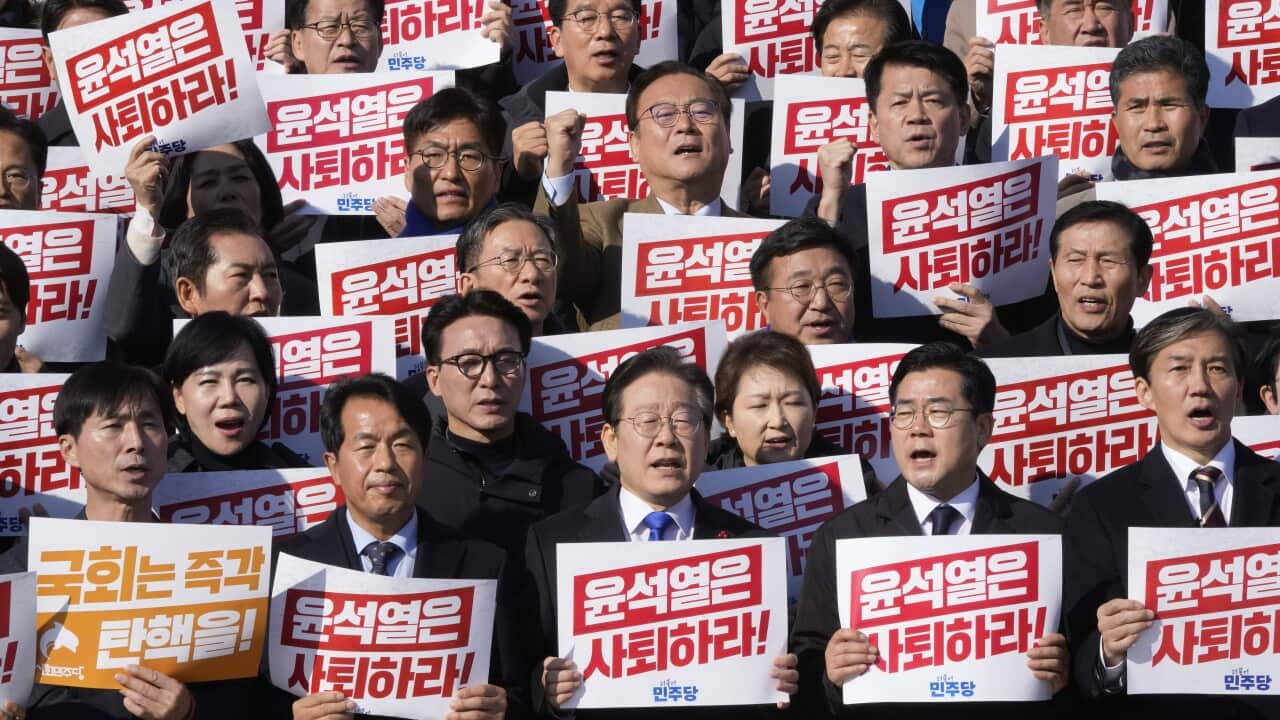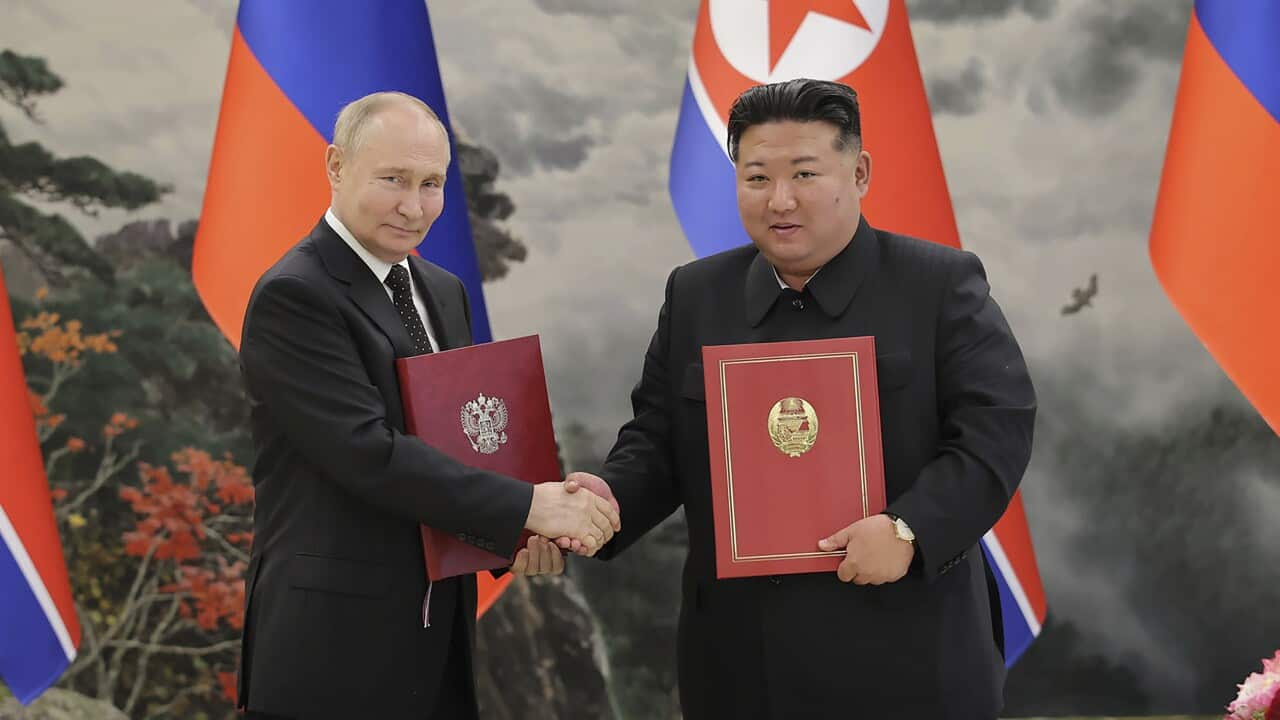Key Points
- South Korea was plunged into turmoil on Wednesday after its president declared martial law.
- The country's opposition has submitted a bill in parliament to impeach President Yoon Suk Yeol.
- NATO is monitoring the situation, secretary general Mark Rutte said.
South Korea's opposition moved to impeach President Yoon Suk Yeol on Wednesday after his extraordinary but short-lived imposition of martial law that brought thousands of protesters to the streets.
Yoon's shock bid to suspend civilian rule for the first time in over four decades — before being overturned by lawmakers in a night of drama — plunged South Korea into deep turmoil and alarmed its close allies.
The future of Yoon, a conservative politician and former star public prosecutor who was elected president in 2022, is now highly uncertain.
South Korea's opposition parties — whose lawmakers jumped fences and tussled with security forces to vote down the law — on Wednesday filed a motion to impeach Yoon.
"We've submitted an impeachment motion prepared urgently," said Kim Yong-min from the opposition Democratic Party (DP).
They were yet to decide when to put it to a vote, but it could come as soon as Friday.
The opposition holds a large majority in the 300-member parliament and needs only a handful of defections from the president's party to secure the two-thirds majority needed to pass the motion.
Earlier the DP said it would file charges of "insurrection," against Yoon, his defence and interior ministers and "key military and police figures involved, such as the martial law commander and the police chief", the DP said in a statement.
The Australian Department of Foreign Affairs and Trade's travel advice service, Smartraveller, released an update on Wednesday morning advising that "the situation in South Korea is evolving due to developments in domestic politics".
It recommended Australians in South Korea "avoid protests and demonstrations", monitor the media for updates and follow the advice of local authorities.
It said the Australian embassy in Seoul remains open but is not offering in-person services.
What is martial law?
Martial law is the temporary introduction of military authority to an area.
South Korea's constitution says its president can declare martial law when it's considered necessary to cope with a military threat or maintain public safety.

South Korean Police stand guard at the National Assembly as hundreds of protesters gather outside. Source: Getty / Chung Sung-Jun
They have the power to take actions related to arrests of persons, search and seizure, speech and the press, and assembly.
After Yoon declared martial law, army chief General Park An-su took charge as martial law commander and immediately issued a decree banning "all political activities".

The imposition of emergency martial law came after President Yoon Suk Yeol's approval rating dropped to 19 per cent in a poll last week. Credit: Chung Sung-Jun / Getty Images
The president must notify the National Assembly of the decision when declaring martial law, and it must be reviewed by the cabinet.
Why did Yoon Suk Yeol declare martial law?
Yoon gave a range of reasons to justify his announcement — South Korea's first declaration of martial law in more than 40 years.
"To safeguard a liberal South Korea from the threats posed by North Korea's communist forces and to eliminate anti-state elements plundering people's freedom and happiness, I hereby declare emergency martial law," he said during his live televised address to the nation.
Yoon did not cite any specific threat from the North, instead focusing on his domestic political opponents, but the South remains technically at war with the nuclear-armed North.
"Our National Assembly has become a haven for criminals, a den of legislative dictatorship that seeks to paralyse the judicial and administrative systems and overturn our liberal democratic order," Yoon said.
He labelled the opposition, which holds a majority in the 300-member parliament, as "anti-state forces intent on overthrowing the regime".
Yoon described the imposition of martial law as "inevitable to guarantee the continuity of a liberal South Korea", adding that it would not impact the country's foreign policy.
He described the current situation as South Korea "on the verge of collapse, with the National Assembly acting as a monster intent on bringing down liberal democracy".

President Yoon Suk Yeol declared martial law on Tuesday night. Source: AAP, AP / AP
What could happen next?
Six South Korean opposition parties on Wednesday submitted a bill in parliament to impeach Yoon, with voting set for Friday or Saturday.
"It was clearly revealed to the entire nation that President Yoon could no longer run the country normally. He should step down," senior Democratic Party member Park Chan-dae said in a statement.
There were deep divisions in Yoon's ruling People Power Party as well, as its leader called for Defence Minister Kim Yong-hyun to be fired and the entire cabinet to resign.
Meanwhile, South Korea's largest umbrella labour union has called an "indefinite general strike" until Yoon resigns.
The 1.2 million-member Korean Confederation of Trade Unions accused Yoon of an "irrational and anti-democratic measure", saying he had "declared the end of (his) own power".
The union also said it would hold a rally later in the day in downtown Seoul. Several other protests are expected, including near the National Assembly.

National Assembly staff sprayed fire extinguishers to block soldiers from entering the building's main hall. Credit: AP
What led to this point?
Yoon, a career prosecutor, squeezed out a victory in the tightest presidential election in South Korean history in 2022.
He rode a wave of discontent over economic policy, scandals and gender wars, aiming to reshape the political future of Asia's fourth-largest economy.
But he has been unpopular, with his support ratings hovering at around 20 per cent for months.
Yoon's People Power Party suffered a landslide defeat at a parliamentary election in April this year, ceding control of the unicameral assembly to opposition parties that captured nearly two-thirds of the seats.
His party and the main opposition Democratic Party are bitterly at odds over next year's budget.
Opposition MPs approved a significantly downsized budget plan through a parliamentary committee last week.
The opposition has slashed approximately 4.1 trillion won ($4.5 billion) from Yoon's proposed 677 trillion won ($736 billion) budget plan, cutting the government's reserve fund and activity budgets for Yoon's office, the prosecution, police and the state audit agency.
In his address on Tuesday night, Yoon also cited a motion by the Democratic Party this week to impeach some of the country's top prosecutors.
How did the world react?
US Secretary of State Antony Blinken said he welcomed Yoon's decision to rescind the martial law declaration.
"We continue to expect political disagreements to be resolved peacefully and in accordance with the rule of law," Blinken said in a statement.
South Korea hosts about 28,500 American troops as a legacy of the 1950-1953 Korean War.
Planned defence talks and a joint military exercise between the two allies were postponed amid the broader diplomatic fallout from the overnight turmoil.
Sweden's prime minister postponed a visit to South Korea, a spokesperson said, and Japan's lawmaker group on Korean affairs cancelled a trip to Seoul set for mid-December.
NATO Secretary General Mark Rutte said the alliance was monitoring the current situation in South Korea, but added that its relationship with Seoul "was ironclad".











